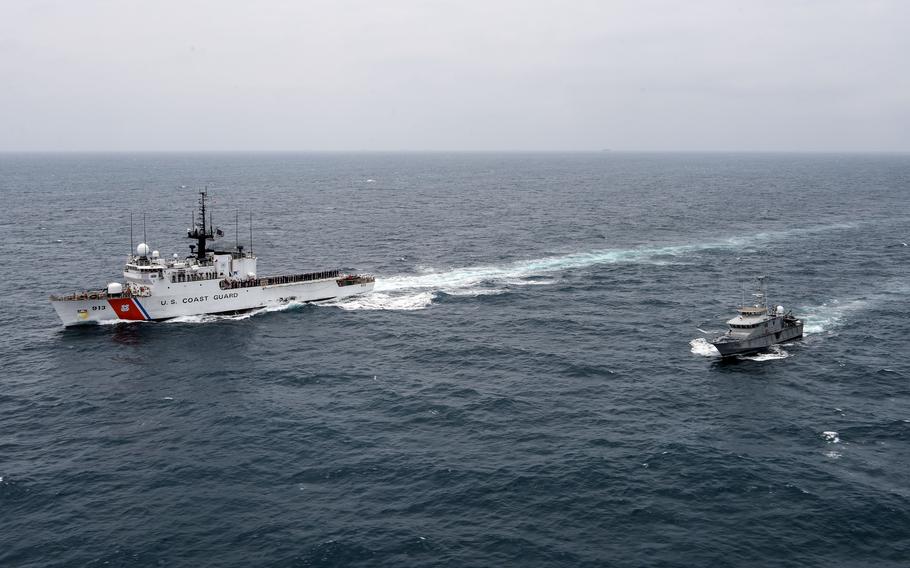
USCGC Mohawk sails alongside a Nigerian navy ship in the Atlantic Ocean, Aug. 22, 2022. Mohawk is on a scheduled deployment in the U.S. Naval Forces Africa area of operations. (Jessica Fontenette/U.S. Coast Guard)
Surprised by the arrival of a heavily armed American vessel, Chinese boats surreptitiously fishing for squid near Ecuador this past summer fled in a panic. Meanwhile, Nigerian sailors received American training on combating piracy and an American cutter seized millions of dollars’ worth of heroin from a smuggler in the Gulf of Oman.
A busy summer for the U.S. Navy? No. The U.S. Marine Corps at work? Nope.
The U.S. Coast Guard is increasingly operating far from American coasts and undertaking missions quite different from more well-known ones like rescuing swimmers or aiding in ecological disasters. The “Coasties” are pushing hard to be seen as a tool for confronting geopolitical rivals and accomplishing foreign policy objectives in any waters of the planet.
A globe-trotting USCG is dangerous for both foreign and domestic reasons. Internationally, the use of the Coast Guard in areas distant from American coasts and lacking obvious American sovereignty interests risks needless tension and establishes an undesirable precedent.
At home, allowing the Guard to justify larger budget requests by expanding its mission further encourages military branches to inflate threats or invent questionable new missions in the fierce competition for funding.
Housed within the Department of Homeland Security in peace time, the Coast Guard’s diverse list of statutory missions ranges from migrant interdiction to icebreaking. It also includes a lesser-known charge to support Department of Defense homeland defense operations.
The Coast Guard has certainly leaned into this role. USCG vessels supported the Pentagon a total of 326 days in 2019, a noticeable jump from between 50 to 100 days during the previous five years. Unfortunately, the Coast Guard’s DOD collaborations increasingly include missions without a clear tie to homeland security.
In May 2021, USCG Maui fired 30 “warning shots” at an Iranian fast boat while accompanying U.S. Navy ships in the Strait of Hormuz. Just months later, USCG Munro tagged along on a tense transit of the Taiwan Strait. In the interim, the USCG Hamilton exercised with the Ukrainian navy in the Black Sea.
America’s use of a primarily domestic security force in these far-flung and hotly contested areas risks worsening tough diplomatic situations. Coast Guard operations like these have elicited furious reactions from Iran and China amid already strained relations with both.
Some have argued that the Coast Guard is better suited to conduct overseas missions like freedom of navigation operations (FONOPs) because a USCG cutter is less threatening than a U.S. Navy warship. But how would the United States react if other nations attempted this with their coast guards in American waters? Would Washington be any less alarmed if the Chinese and Russian ships that entered the American exclusive economic zone of the Bering Sea in September were “only” coast guard vessels? Of course not, so America would be wise not to establish that invasive precedent with its own Coast Guard.
Even if it doesn’t make strategic sense, there is an understandable bureaucratic logic to the Coast Guard’s pursuit of these missions. The other military branches understand well that the more relevant they seem to the strategic issue of the day, the more responsibilities (and therefore money from Congress) they can expect.
Coast Guard boosters have seized on the return of great power competition to argue for forward deployment to Japan and a dramatically increased budget for new missions to counter China. Others propose that the Guard become the preeminent service for maritime FONOPs throughout the entire Pacific. Expanded Russian activity in the Arctic is often cited in arguments for new polar icebreakers whose costs could run into the billions of dollars and add another suite of missions for the USCG in the High North.
Lawmakers should be wary. From illegal fishing in South America and drug smugglers in the Middle East to African pirates and Russians prowling the North Pole, there will always be plenty of monsters abroad that America could seek out with the Coast Guard. This temptation is especially strong for a military branch when such mission creep is rewarded with institutional prestige and dollars.
However, the Coast Guard is first and foremost an instrument for American homeland defense. Narrowly defining this goal and ensuring that the Coast Guard remains focused on it will avoid the risk of international escalation or retribution. Most importantly, reining in the Coast Guard’s push to intervene all over the map might just be the first step to restoring some prudence to the other services’ operations too.
Andrew C. Jarocki is a master’s student at the McCourt School of Public Policy at Georgetown University. He formerly served as the editor-in-chief of Realist Review, and his work has appeared in Defense News, The National Interest and Responsible Statecraft.